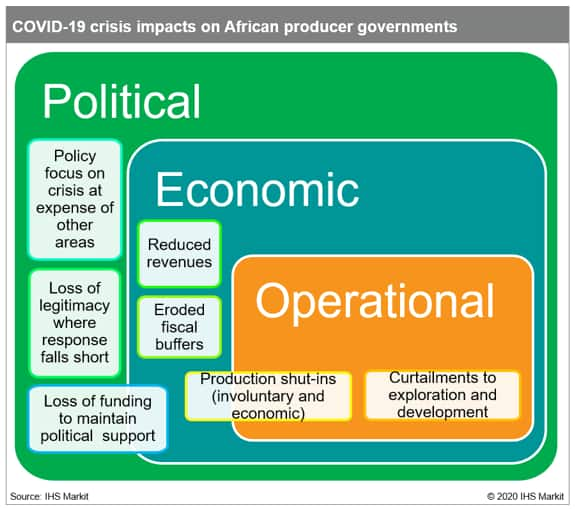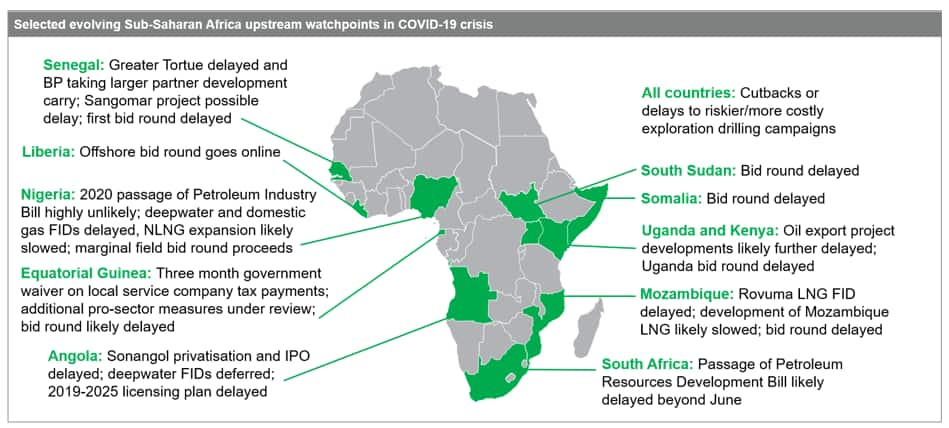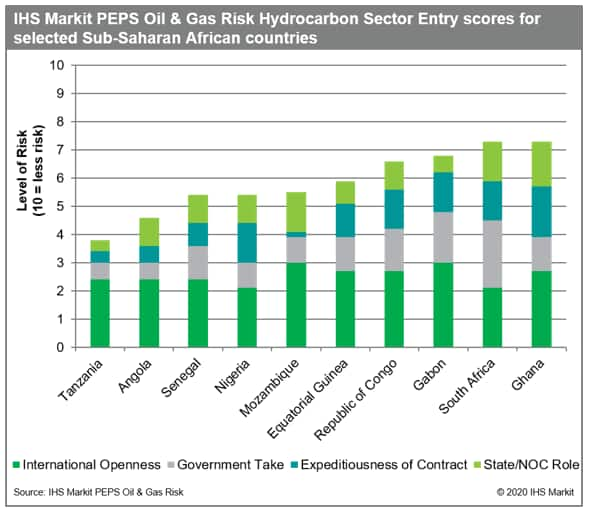Customer Logins
Obtain the data you need to make the most informed decisions by accessing our extensive portfolio of information, analytics, and expertise. Sign in to the product or service center of your choice.
Customer Logins
BLOG
Apr 22, 2020
How can African governments drive a hydrocarbon sector rebound from the COVID-19 crisis?
The impacts of the coronavirus disease 2019 (COVID-19) crisis on Sub-Saharan Africa's upstream hydrocarbon sector will be broad and deep, and after the crisis, African governments and regulators face the challenge of seizing the opportunities presented by an upstream investment rebound.
Political and economic risks intensify
Crude-dependent African producers - still grappling with
the effects of the 2014 crude price fall - are again facing
substantial economic and fiscal challenges amid dwindling crude
demand and low prices. The COVID-19 crisis and related recessions
across Africa are likely to cause humanitarian challenges and
societal impacts that could linger for years, which will undermine
regional and country-level stability and exacerbate
hydrocarbon-sector above-ground risks from frontiers to mature
producers.

Figure 1: COVID-19 crisis impacts on African producer
governments
Operational disruptions set to spread
The spread of the COVID-19 virus in Sub-Saharan Africa is
at a relatively early stage, but more substantial
hydrocarbon-sector operational disruption is likely as the outbreak
evolves because of restrictions on, and shortages of, staff and
interruptions to supply chains. This could limit both exploration
and development drilling, negatively affecting production across
the near, medium, and long term. Moreover, market oversupply, high
operating costs amid low prices, and the lack of regional storage
could drive near-term production shut-ins at the highest cost
African projects, compounding the expected reduction in government
revenues.
Foreign upstream investment
Sub-Saharan African countries are generally highly reliant
on foreign upstream investors, making them more vulnerable as
companies seek to reduce capital spending amid the crisis. Riskier
and higher-cost unsanctioned African upstream projects will face
delay, while partnership risks related to financially stressed
smaller E&P companies and national oil companies (NOCs) will
increase, in turn influencing the majors' appetite to progress
projects.

Figure 2: Selected evolving Sub-Saharan Africa upstream
watchpoints in COVID-19 crisis
Implications for government decision-making
The administrative and decision-making capacity of African
governments is likely to be stretched by the near-term impacts of
the COVID-19 crisis, which means that expected key hydrocarbon
sector legislation and reforms are unlikely to proceed as planned
in countries such as Nigeria and South Africa. Expected 2020 bid
round launches in South Sudan and Somalia have been delayed - with
delays also likely to planned rounds in Angola and Mozambique -
while ongoing rounds in Gabon, Senegal and Somalia have been
extended.
Reduced capex spending, delayed bid rounds, and slower reforms will negatively affect medium-to-long term hydrocarbon output and state revenues, but - as with previous down-cycles - countries are eventually likely to respond with improved fiscal terms and new incentives for foreign firms to revive upstream investment. However, the speed at which they do so is likely to vary significantly across countries. It took over three years for Angola to respond to the 2014 oil price collapse, similarly Gabon, while Nigeria is yet to fully implement fiscal changes and sector reforms proposed since before 2010.

Figure 3: IHS Markit PEPS Oil & Gas Risk Hydrocarbon Sector
Entry scores for selected Sub-Saharan African countries
Harnessing the investment rebound
When the post-crisis rebound does come, African countries
will face even greater competition for capital, with upstream
investors' balance sheets significantly weakened and
hydrocarbon-sector investment set to remain under pressure from
climate-change concerns driving the energy transition. Simply put,
there is likely to be less exploration, by fewer companies, across
fewer basins.
These challenges will behove Sub-Saharan African countries to take early, pragmatic policy and fiscal actions to maintain their global upstream competitiveness, while offering a stable, facilitating contractual and regulatory environment. At the same time, regulators will need to proactively seek and constructively engage with the upstream investors financially and technically best suited to timely commercialisation of their country's resource base.
Screen upstream opportunities and above-ground risk with one tool: PEPS
IHS Markit experts are available for consultation on the industries and subjects they specialize in. Meetings are virtual and can be tailored to focus on your areas of inquiry. Book a consultation with Roderick Bruce.
Roderick Bruce is a Research and Analysis Associate Director at IHS Markit.
Posted 22 April 2020
This article was published by S&P Global Commodity Insights and not by S&P Global Ratings, which is a separately managed division of S&P Global.
{"items" : [
{"name":"share","enabled":true,"desc":"<strong>Share</strong>","mobdesc":"Share","options":[ {"name":"facebook","url":"https://www.facebook.com/sharer.php?u=http%3a%2f%2fssl.ihsmarkit.com%2fcommodityinsights%2fen%2fci%2fresearch-analysis%2fhow-can-african-governments-drive-a-hydrocarbon-sector-rebound.html","enabled":true},{"name":"twitter","url":"https://twitter.com/intent/tweet?url=http%3a%2f%2fssl.ihsmarkit.com%2fcommodityinsights%2fen%2fci%2fresearch-analysis%2fhow-can-african-governments-drive-a-hydrocarbon-sector-rebound.html&text=How+can+African+governments+drive+a+hydrocarbon+sector+rebound+from+the+COVID-19+crisis%3f+%7c+S%26P+Global+","enabled":true},{"name":"linkedin","url":"https://www.linkedin.com/sharing/share-offsite/?url=http%3a%2f%2fssl.ihsmarkit.com%2fcommodityinsights%2fen%2fci%2fresearch-analysis%2fhow-can-african-governments-drive-a-hydrocarbon-sector-rebound.html","enabled":true},{"name":"email","url":"?subject=How can African governments drive a hydrocarbon sector rebound from the COVID-19 crisis? | S&P Global &body=http%3a%2f%2fssl.ihsmarkit.com%2fcommodityinsights%2fen%2fci%2fresearch-analysis%2fhow-can-african-governments-drive-a-hydrocarbon-sector-rebound.html","enabled":true},{"name":"whatsapp","url":"https://api.whatsapp.com/send?text=How+can+African+governments+drive+a+hydrocarbon+sector+rebound+from+the+COVID-19+crisis%3f+%7c+S%26P+Global+ http%3a%2f%2fssl.ihsmarkit.com%2fcommodityinsights%2fen%2fci%2fresearch-analysis%2fhow-can-african-governments-drive-a-hydrocarbon-sector-rebound.html","enabled":true}]}, {"name":"rtt","enabled":true,"mobdesc":"Top"}
]}

